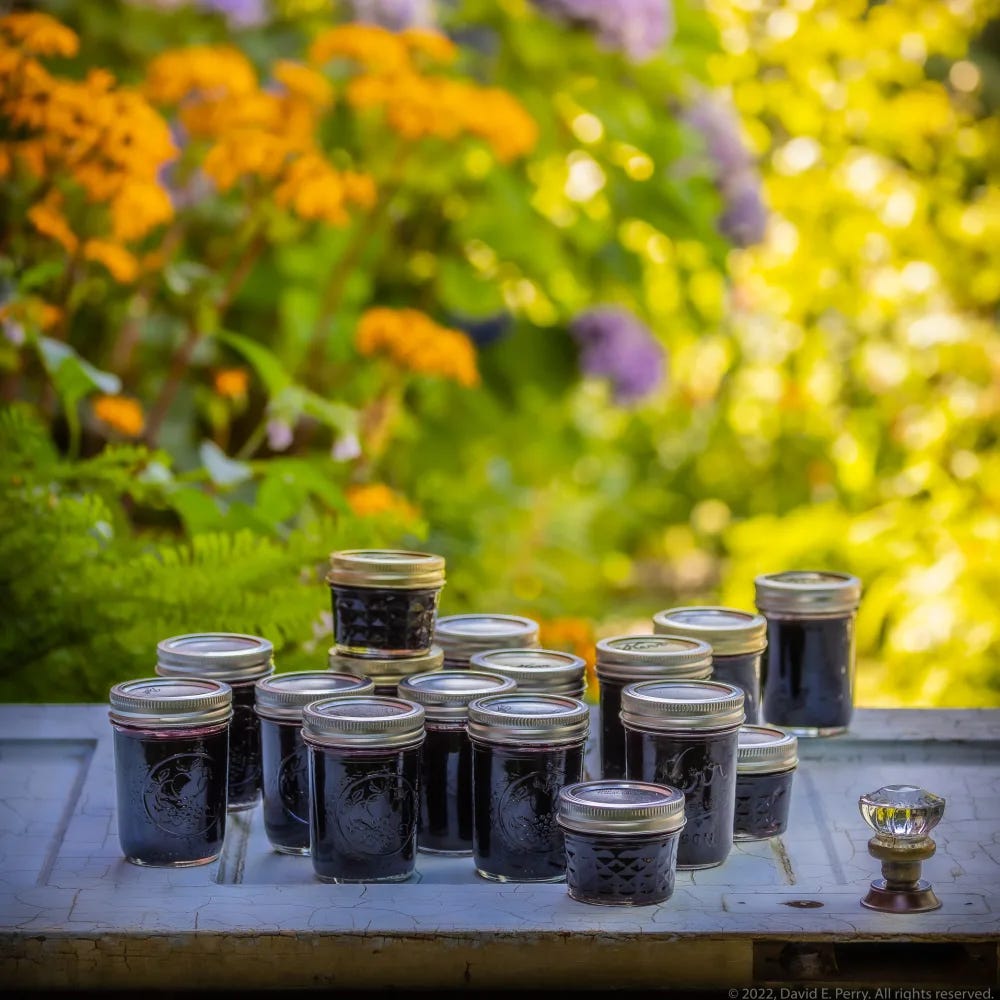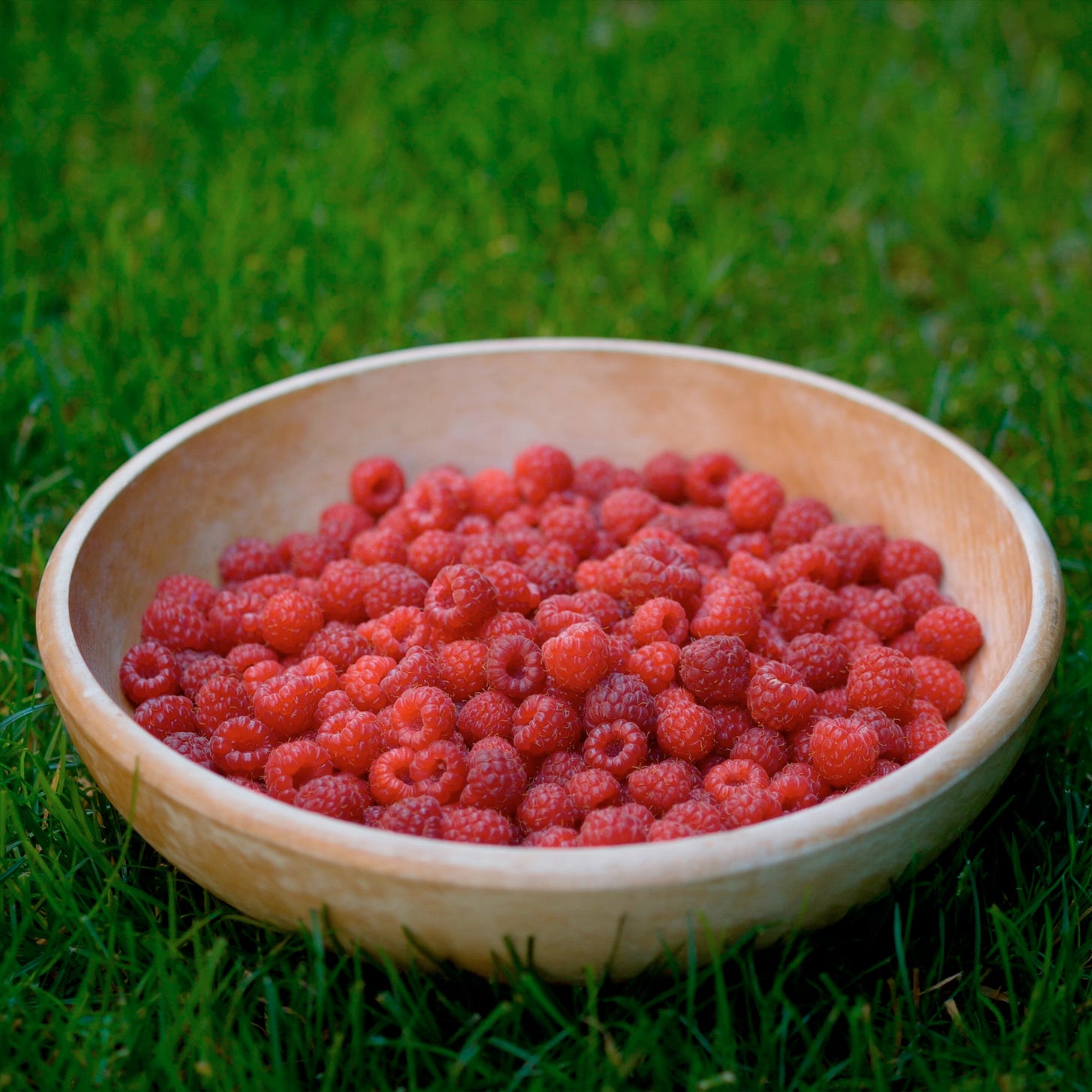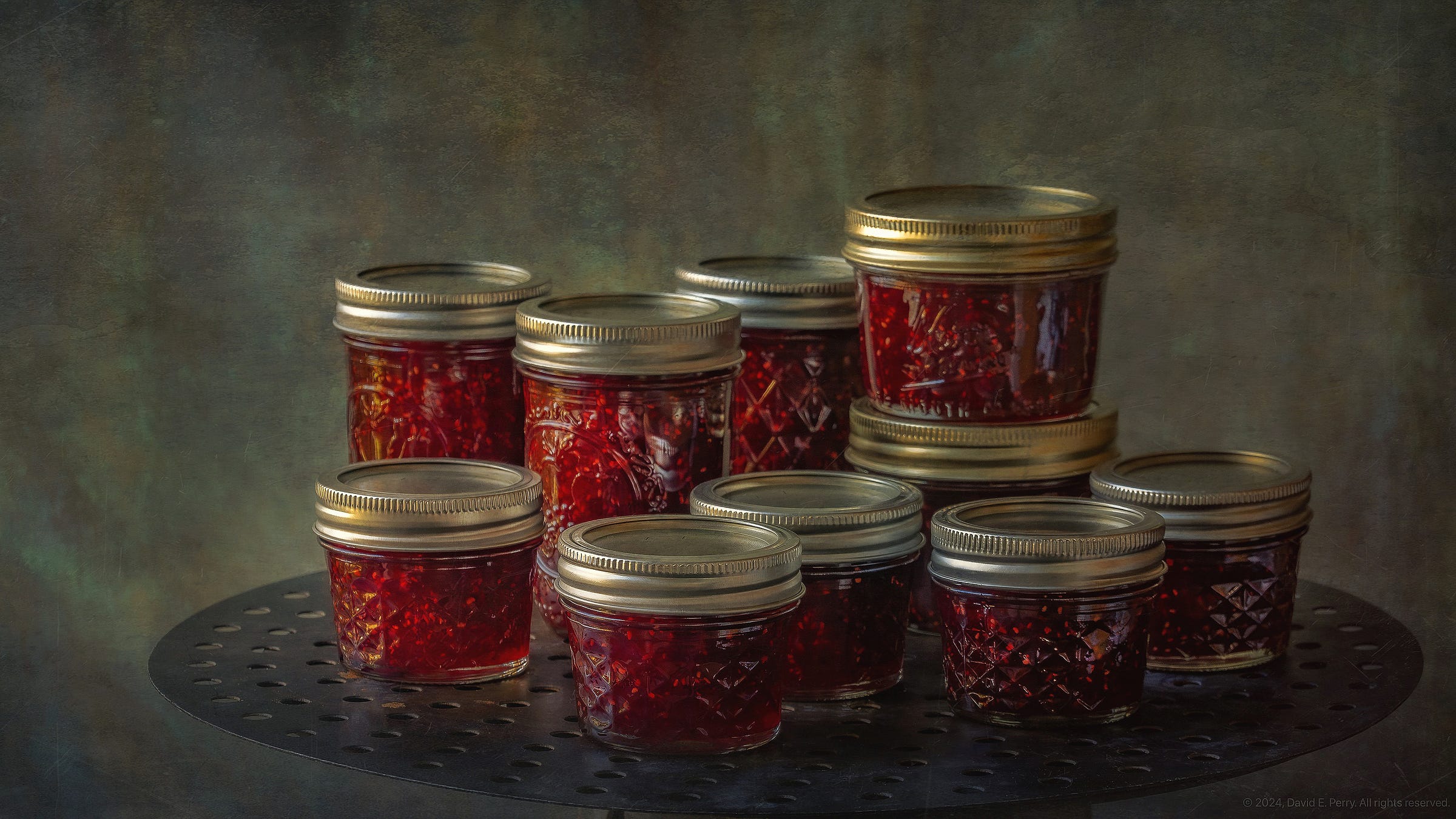On learning to make jam; a piffle
Young, bored, eager to learn and feeling adrift.
pif·fle
/ˈpif(ə)l/
noun
INFORMAL, perhaps imitative of a puff of air
Ruby is lonely and bored, and thinking about sour cherry jam. Again. Imagining fork-split English muffins toasted to golden perfection, melting butter and garnet red, confiture de griottes. Her eyes roll slightly upward. Her mouth waters.
In the next moment she is thinking about apricot preserves, imagining herself spooning a bit of that tangy, sweet, butterscotch-colored ambrosia onto a bite of warm croissant from la charmante boulangerie au coin, just as she had on six consecutive mornings last October in Paris.
Ruby really would like to learn how to make her own jams and preserves, cheerful little jars and lids, perfect, ripe flavors, less sugar, more fruit and none of those mysterious, food industry chemicals; she longs to conjure magic in a glass pot. But the thought of doing even one more thing solo, spending even more hours alone in her tiny apartment staring at a screen makes a part of her want to weep. “Food is meant to be shared,” she whispers, remembering her own grandmother’s words. It all feels like too much.
Nowadays, if you’re young (or young-minded), and want to learn to do something new to you, but ‘old school’ too, you no longer need a mentoring grandparent or a patient ‘Uncle Bob’ or ‘Auntie Ada.’ Now you and anyone else can watch a YouTube video or an informative TikTok, which seems kinda wonderful, for it not only allows you access to valuable information but also allows access to it whenever you’re in the mood, even when everyone else is sleeping and you can’t. And it gives you the power to pause and replay the tricky parts as many times as you need to actually learn all the right moves.
If that’s how you learn best it might seem almost perfect, barring a few, raggedy-edged holes to the contrary.
But what if, like jam-loving Ruby,
…you’re lonely?
Ruby went to bed dreaming of jam and awakened with an idea…
What if she could find an older woman in some assisted living center who was lonely too, whose kids and grandkids only visit on holidays, if at all, and who has been canning tomatoes and peaches, and applesauce, and preserves her whole life without having ever killed a single soul or made anyone sick? Surely that person is out there somewhere, she thought; a former farm wife, a pragmatic mother, a grandmother, a problem solver.
Surely there must be someone who would be delighted to be recognized as a badass once again, an expert in a lovely, meditative and ever so tasty skillset she still, even in her seventies or eighties knows far more about than Ruby knows about almost anything.
But how would one find such a person, she wondered? How could she come up with a way to introduce herself? Find common ground? How could she create a safe space? How might she tease out this canning goddesses’ stories? Begin building trust?
People don’t readily trust other people anymore. Too many nightmare stories. Too few good. In order to properly protect themselves, seniors are taught caution, they are told they need to assume the worst in others, steel themselves against any efforts at disarming their protection perimeters. They are fenced in by the fears their family members imagine for them, appeal to their sense of duty to enforce and respect.
Isn’t there some way to put a knowledgable, older woman together with an eager to learn young one, …so she doesn’t have to resort to watching a YouTube video to try to learn to make jam?
“What if I put up handwritten ‘wanted’ ads on the community bulletin boards of each of the assisted living centers, nearby?” she wondered. “Or start volunteering?”
Ruby began writing down notes in case she ever figured out how to meet this wondrous, normal, everyday person she was envisioning:
“Ask her questions and actually listen to her answers.”
“Don’t make too big a fuss if she starts to cry a little. She’s just not used to being asked questions that go much deeper than how she’s feeling this morning, and whether she pooped or remembered to take her medicines. Having someone like you paying attention is something she had surrendered any hope of nearly a year ago when she moved to assisted living, after she and her husband gave up the ranch and moved into town to be nearer the kids, after he passed away just two weeks shy of their fifty-third anniversary, following a year-long battle with cancer, after her granddaughter rolled her eyes in an emphatic ‘No way!’ when offered her wedding china. Downsizing her life and moving into assisted living had offered several such gut-punches.”
“Tell her about your hopes and dreams, your carefully planned foreign travels, your subsequent fondness for regional confitures and preserves.”
“When you’ve listened and learned her story, when you’ve risked and confided bits of your own, when you’ve earned her trust by shining the warm light of attention upon her then dial up your courage and ask if she would ever consider teaching you some of what she knows about canning, about making jam.”
“Then, if she agrees, no, when she agrees, carefully gather all the things, every one of them she tells you you’ll need. Make all the proper arrangements to safely check her out of the facility for the morning, or afternoon, whichever you both agree upon.”
“Buy her breakfast in a cafe, or lunch, if she agrees to it, then head to your kitchen where you set her up in a comfortable chair within sight of the stove and do just as she directs.”
Canning jams and jellies, fruit preserves and pickled things isn’t particularly difficult, but there are things you need to know. Several things. Little things, like adding just a bit of butter to a bubbling pot of berry jam that is beginning to get foamy on top while it cooks toward jelly stage, or how to keep your jars hot and germ free until just before you fill them with that bubbling jam by washing them in hot, soapy water and rinsing them, even if they look clean, before beginning to actually cook the jam, then turning them upside down (openings down), in a shallow pan of water in a 200 degree oven, keeping them there until you’re ready to fill them, wiping the rims with a damp cloth, then carefully placing your simmering-water, sterilized lid atop, twisting down the band till snug, and processing, submerged in a boiling water bath for the allotted length of time.
I learned to can: peaches, pears, applesauce, spiced crabapples, bread and butter pickles, grape jelly, apricot preserves and blackberry jam, all from my paternal grandmother, with occasional assists from my beloved stepmom. To the best of my knowledge no one has ever died or been sick from anything I’ve put up in a jar, for I am as careful as Grandma was, as careful as she taught me to be. I strive to protect her memory and reputation as my teacher, at least as attentively as my own.
Time in my grandmother’s kitchen, listening and watching, tasting, smelling, applying myself to whatever simple tasks she gave me to do as her helper was an immense privilege, a luxury that started me down a road I’ve been traveling most gratefully, ever since. Well into my mid-sixties now, I made a couple of batches of wild blackberry jam earlier this summer when the inky, purple berries gathered deep in a river canyon were perfectly ripe, and just yesterday, after picking and freezing enough raspberries over the past two weeks for a batch of late-harvest raspberry jam I donned my apron and wizard’s wand to conjure up ten, tasty, bright jars of Confiture de framboises for holiday gifting and morning toast.
Mary has canned batches of rhubarb-ginger jam, peach jam, apple butter, Italian plum butter, fresh strawberry preserves from our garden and strawberry-rhubarb jam, as well this summer. We take turns, as the spirit moves us preserving the tastes of summer to add tasty, bright spots throughout our rainy winters.
You may or may not be able to conjure some variation on my imagined friend, Ruby in your mind. Or you may, yourself, be her. Or at least a little bit like her.
I wonder how it might go if we, when confronted with holes in our existences and echoing caverns within our understanding could learn to think beyond the lament of ‘I wish’ and instead, step toward the hope of ‘what if…’
What if you decided you wanted to learn how to make jam but had no one in your family to pass along the methods and madness that are the origins of such magic? Could you grant yourself permission to invest the time and energy that might or might not lead you to that person? And ‘what if’ you found her… or him? Would you be able to muster up the courage to ask?
If you did, if you do, you’ll have jam in the end, or quart jars of beautiful, canned peaches a hundred times better than any peach you ever tasted from a tin, or boppledots (applesauce,) to make you swoon, or tomato sauce, fragrant with the basil and thyme that you grew in pots just outside your back door. And with a bit of luck you might have a wonderful new friend, as well, a grateful, less lonely person who loves standing within that warming ray of sunshine that is being seen by you, being recognized once again, acknowledged as a keeper of sacred wisdom, generational treasures, treated as someone worth spending time with, worth making a fuss over, worth listening to.
You can do all that. But only if you want to.
Now remember, when you take your new and for now, merely imagined friend back to the senior center after your canning lesson, stick a couple of jars of that jam in a bag for her, and maybe a fresh baguette and some nice, French butter. ‘Sharesies.’
And just picture it. Why, she’ll be the belle of the ball back at the assisted living center, bearing tasty treats to share and a tale of wonder to regale her pals with. She’ll almost certainly walk a bit taller and lighter on her feet, and her eyes will surely sparkle, for she will feel seen and at least a little bit important again.
You and yes, Ruby will be responsible for all of that.
And to sweeten the pot even more, well …you’ll have also learned to make jam.






This is a truly lovely thought. I hate that it conjures up the feeling of fear. Just like the fear of having a pet that I can’t provide them the life they need. That I will hate them for their dependency on me. Fear of feeding birds that I am now making them dependent and what happens if I move away. Fear of making a friend who needs me because I will probably fail them in the end, and an older friend that I couldn’t stomach the thought of hurting. Being alone is lonely, but being alone is safe, except that it really is not. It is a lamentable feeling.
My Mom had a younger friend who was dear to her. This friend wanted to learn the sheep raising business. My Mom loved teaching her. As my Mom aged and couldn’t participate, the friend slowly eased away. As other family members were not happy with the friendship, she stepped aside. There were many reasons. My Mom was never one to hold a grudge. My Mom still loved her. Mom missed her a lot.
David, your huge encompassing heart is a joy to read always, but here, as I store away all my preserves for the year, potted and labelled ( at least mostly ) and breathe a huge sigh of contentment to have been taught to do so in the great tradition of jam making, I thank the gods for people like you that always, always think of others less fortunate and lonely. I wish I could share my overfilled store cupboards with each and every one. And next year, if Ruby would like to call by, I will gladly teach her each and every secret my mother taught me - this is beautiful and yes, what if? What if holds much magic of that Im certain...